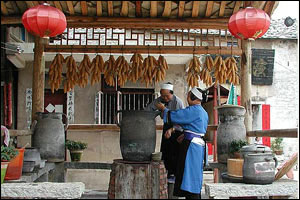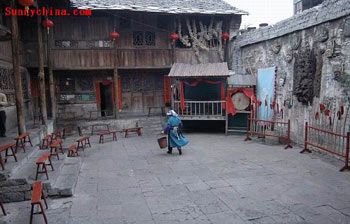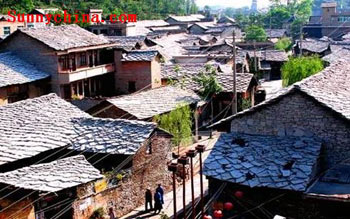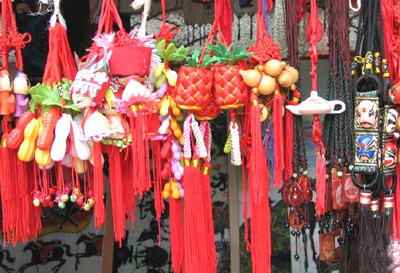| Tools: Save | Print | E-mail | Most Read |
| Ming Village Fortress |
| Adjust font size: |
The tunpu (village fortress) in
The tunpu (village fortress) in History Originally constructed in the Ming Dynasty (1368-1644) as fortresses, tunpus, echo a certain military function. When the first Ming emperor, Zhu Yuanzhang, came to power, the army and locals in Anshun constructed villages as military sites. Each village included forts, sentries and toll gates. In those days, soldiers spent most of their days working as farmers. It was only in times of war that they were called to unify and repel an enemy. People living in the tunpus were forbidden to marry people of other ancestries. Even after the passage of hundreds of years, residents of the tunpu retain their traditional Ming lifestyles, clothing and hair styles.
Main tunpu Tianlong tunpu The most popular destination for tunpu tourists in Anshun is Tianlong tunpu. Since the Yuan Dynasty (1271-1368), Tianlong has been the tunpu with the most armies and post houses. A Ming-style teahouse is located at the entrance of the village. Waitresses there dress in Fengyang Han clothes, a style of clothing which originated in the Ming period, and is named after Zhu Yuanzhang's hometown,
Entering the lanes of the village, you will see barracks. The mountains around the Tianlong tunpu are almost an archive of historical buildings. Ancient ramparts and the castle-style Yunfeng Tunpu Yunfeng tunpu is the most complete military defense post, built with stone gates and towers. Yunshan tun is one of the spots. It is located in the canyons of the A stony main street crosses the village from east to west. There are drama stages, a temple to the God of Wealth, ancestral temples and traditional Chinese medicine stores. Residences and blockhouses are connected by twisting lanes and built into the mountain. The tunpu is built to be an ironclad defense.
Spots to see Drama stage The remains of the Jiangnan drama stage lie alongside
Tunpu museum The Folk art - Dixi (earth opera)Dixi is a kind of open-air performance enjoyed by the tunpu dwellers. Performers sing, recite, act and fight. Most of the popular operas are about historical stories set before Ming Dynasty, like wars between The masks used in Dixi are typical of folk art in central Dixi is considered a living fossil of Chinese opera, and has been performed in foreign countries including What to eat The tunpu boast a great assortment of truly traditional foods. People eat ciba, gaoba and baoguba made of sticky rice, their main staple. Non-staple foods include preserved ham, sausage, bloodcurd, dried, salty vegetables and dried fermented soybeans. All the foods are perfect for long-term storage. The food traditions of the tunpu originate from army cooking. Soldiers lived a turbulent life, and it was inconvenient for them to cook. Instead, they salted and smoked vegetables for storage. Where to stay There are no hostels in most of the tunpu. Your best bet is to live in Guizhou Shengfeng Hotel (five star) Address:No 69, Shenqi Lu, Nanming District Tel: 0851-5568 888 Price: 540 yuan Guiyang Lihao Hotel (four star) Address:No 115, Ruijin Bei Lu Tel: 0851-6521 888 Price: 398 yuan Guiyang Ruijin Hotel (three star) Address: No 62, Ruijin Nan Lu Tel: 0851-5209 999 Price: 186 yuan Getting to the tunpu Most tourists travel to the tunpu from In Anshun, take a bus from the stadium stop to To reach the Tianlong tunpu, first take a bus at the stadium stop in (
|
| Tools: Save | Print | E-mail | Most Read |
 |
| Related Stories |
|
|
Product Directory China Search |
Country Search Hot Buys |




